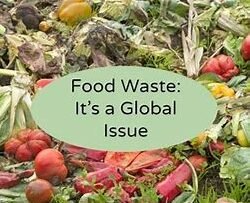Food waste is a significant global issue with far-reaching environmental, economic, and social impacts.

1. Scale of Food Waste:
- Global Waste: Approximately one-third of all food produced for human consumption is wasted globally each year. This amounts to about 1.3 billion tons of food.
- Household Waste: A substantial portion of food waste occurs at the household level, where perfectly edible food is discarded due to over-purchasing, improper storage, or misunderstanding expiration dates.
2. Environmental Impact:
- Greenhouse Gas Emissions: Food waste contributes to climate change. When food decomposes in landfills, it produces methane, a potent greenhouse gas. If food waste were a country, it would be the third-largest emitter of greenhouse gases.
- Resource Depletion: Wasting food means wasting the resources used to produce it, including water, energy, and land. For example, it takes about 1,800 gallons of water to produce one pound of beef, and when that beef is wasted, so is the water used to produce it.
- Deforestation and Habitat Loss: Agriculture is a leading cause of deforestation and habitat destruction. Reducing food waste can help alleviate pressure on natural habitats and preserve biodiversity.
3. Economic Impact:
- Financial Losses: Food waste represents a significant economic loss. The Food and Agriculture Organization (FAO) estimates that the global economic cost of food waste is around $1 trillion annually.
- Household Budgets: For individual households, reducing food waste can lead to significant savings. Families can save money by planning meals, buying only what they need, and properly storing food.
4. Social Impact:
- Food Insecurity: While vast amounts of food are wasted, millions of people around the world suffer from hunger and food insecurity. Redistributing surplus food can help address this disparity.
- Ethical Considerations: Wasting food raises ethical concerns, especially when considering the labor and resources that go into food production and the moral responsibility to feed the hungry.
Strategies to Reduce Food Waste:
- Improved Planning: Plan meals and create shopping lists to avoid over-purchasing.
- Proper Storage: Store food correctly to extend its shelf life and prevent spoilage.
- Education: Increase awareness about food expiration labels, such as “best before” versus “use by” dates, to reduce confusion.
- Food Recovery: Support food recovery programs that redistribute surplus food to those in need.
- Composting: Compost food scraps to recycle nutrients back into the soil, reducing the burden on landfills.
Conclusion:
Addressing food waste is crucial for environmental sustainability, economic efficiency, and social equity. By adopting better food management practices and raising awareness, we can significantly reduce the negative impacts of food waste.
